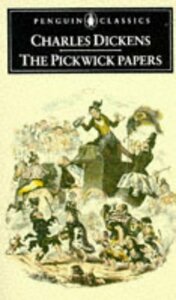You need to sign in or sign up before continuing.
Take a photo of a barcode or cover
This is a long book to get through so I warn you if you are not a big fan of historical literature or Charles Dickens it is not for you. It is definitely funny and at times ridiculous but I won't lie, it can be trying. I say that because 900+ pages of middle class adventures well can get boring. In Dickens' time it came out as a serial, I can see it that way as very enjoyable.
Took me well over a year to read in fits and starts. Parts were enjoyable, parts were brutally boring. In my quest to read all of Dickens, this is not my favourite, but I am glad that I read it.
Charles Dickens' very first novel is truly a great account of history of his time (and slightly of his own life). Charles Dickens was barely 24 when the first monthly serial was published on April of 1836.

There are many times, I had to admit, that I came drifted off brought by excessive verbosity but, wordy it may be, way as classical writers, Victorian or not, Charles Dickens execution to Pickwick's adventure is a rightful one.
Full of adventures, tales, poems, Dickens relates a perfect model and honourable man.


There are many times, I had to admit, that I came drifted off brought by excessive verbosity but, wordy it may be, way as classical writers, Victorian or not, Charles Dickens execution to Pickwick's adventure is a rightful one.
Full of adventures, tales, poems, Dickens relates a perfect model and honourable man.

I really have an up and down relationship with Dickens. I like his later work far better, where he unfolds a more cohesive story, like Bleak House, or one of his good short stories, like A Christmas Carol. This is just too episodic for me.
I'm not really a fan of the frame story structure anyway. I always find myself much more interested in the stories within the story, and that happens here. You can see the preoccupation with later themes that get developed in better stories. There's the poking fun at society and pretension, the concern for the poor, the mistrust of the law: all of this appears in later work, so it's like Dickens was flexing his muscles here.
I didn't really care about Pickwick and his club. I found Sam amusing, and there were a couple of moments where I smiled, but this was very hit and miss for me. I'd like to read the best stories from it again, but I wouldn't reread the whole book.
I'm not really a fan of the frame story structure anyway. I always find myself much more interested in the stories within the story, and that happens here. You can see the preoccupation with later themes that get developed in better stories. There's the poking fun at society and pretension, the concern for the poor, the mistrust of the law: all of this appears in later work, so it's like Dickens was flexing his muscles here.
I didn't really care about Pickwick and his club. I found Sam amusing, and there were a couple of moments where I smiled, but this was very hit and miss for me. I'd like to read the best stories from it again, but I wouldn't reread the whole book.
I have great affection for this novel. It was the first of the many picaresque novels that I have read, and the reason I read the rest. I spent hours of my adolescence in helpless laughter. So five stars for fond memories, I suppose.
I wasn't expecting Dickens to be slapstick and sarcastic, but the adventures of the Pickwick club read like a Laurel and Hardy interpretation of Watson and Holmes. Dense as fuck, though, and the sarcasm doesn't translate across the ages.
I enjoyed "The Pickwick Papers" enormously. Dickens' satire, observation, and characterization are right on target and remain surprisingly relevant after 180 years. Sure, we may need some notes to help us understand contemporary references throughout, but these are provided in the Penguin Classics edition and are unobtrusive while providing context. Although the members of the Pickwick Club start out as mere caricatures, Dickens is able to transform them through the course of the novel into realistic, substantive individuals. They may be type specimens, but they are also curiously interesting and appealing.
I think the most surprising aspect of the Pickwickians and their world is how very much they resemble our own times. The saying that 'the more things change, the more they stay the same' has never been more aptly demonstrated. From the complete disillusionment of men who think they understand the world from their small, circumscribed perspective to the machinations of those who manipulate law, class, and poverty for their own advantage, this is a world we can recognize all too well. Political rivalry, legal gymnastics, illicit love, working class heroism, and a central character who views most everything through rose-colored glasses all lead to numerous comic (and occasionally tragic) scenes.
I would highly recommend "The Pickwick Papers" despite the lapse of nearly 200 years since it was written. Don't let archaic language or the particulars of a different time and place prevent you from enjoying what is a most entertaining, hilarious, and truly heartening book.
I think the most surprising aspect of the Pickwickians and their world is how very much they resemble our own times. The saying that 'the more things change, the more they stay the same' has never been more aptly demonstrated. From the complete disillusionment of men who think they understand the world from their small, circumscribed perspective to the machinations of those who manipulate law, class, and poverty for their own advantage, this is a world we can recognize all too well. Political rivalry, legal gymnastics, illicit love, working class heroism, and a central character who views most everything through rose-colored glasses all lead to numerous comic (and occasionally tragic) scenes.
I would highly recommend "The Pickwick Papers" despite the lapse of nearly 200 years since it was written. Don't let archaic language or the particulars of a different time and place prevent you from enjoying what is a most entertaining, hilarious, and truly heartening book.
My first book (and maybe first Dickens) of the year was The Posthumous Papers of the Pickwick Club. It was actually Dickens’ first novel, published in serial format in 1836. It’s not so much a novel with an predominant story arc as it is a collection of chronologically-ordered stories about a group of friends who wander around England getting into scrapes. The main character is Mr. Samuel Pickwick, a gentleman of middle age who is accompanied on his adventures by his younger friends Mr. Tupman, Mr. Snodgrass, and Mr. Winkle, and later his trusted man-servant, Samuel Weller. The gentlemen travel about, ostensibly to study human nature, but really, they’re just engaging in one gigantic pub crawl. My favorite thing about Dickens is his very sly sense of sarcasm, and it’s in great evidence here. Mr. Pickwick fancies himself a most erudite and worldly individual, but he’s really rather naive and clueless. Mr. Snodgrass is a poet who doesn’t ever produce poetry, and Mr. Winkle is a “great sportsman” who doesn’t know which end of a horse is the front end. Their scrapes are sometimes romantic, sometimes pugilistic, sometimes legal in nature, and always entertaining. Despite the almost shallow nature of the story as a whole, the reader finds himself wholly invested in these charming characters, and will follow along eagerly to find out how a particular adventure ends. The ultimate ending satisfactorily closes the book on our heroes, and leaves one with a general sense of enjoyment and well-being. There’s not a lot to be “learned” or “understood” from Mr. Pickwick and company … it’s just all in good fun. It is interesting to look at Pickwick from a perspective of it being Dickens’ first major undertaking; the sarcasm, the satire, and the power of description are all there already, and one can sort of look forward to the honing of those skills throughout his later works.
I’ll stop with the wannabe English professor speak now, and just say that though long, this book is a lot of fun, particularly if you’re already a fan of Dickens or of the Victorian period in general. If you’ve already got some Dickens under your belt, and haven’t yet tackled Pickwick, then I return to my challenge and recommend that you follow my lead. You know, if you’re already ahead in your Cannonball count and can afford to only read one book this month.
I’ll stop with the wannabe English professor speak now, and just say that though long, this book is a lot of fun, particularly if you’re already a fan of Dickens or of the Victorian period in general. If you’ve already got some Dickens under your belt, and haven’t yet tackled Pickwick, then I return to my challenge and recommend that you follow my lead. You know, if you’re already ahead in your Cannonball count and can afford to only read one book this month.




